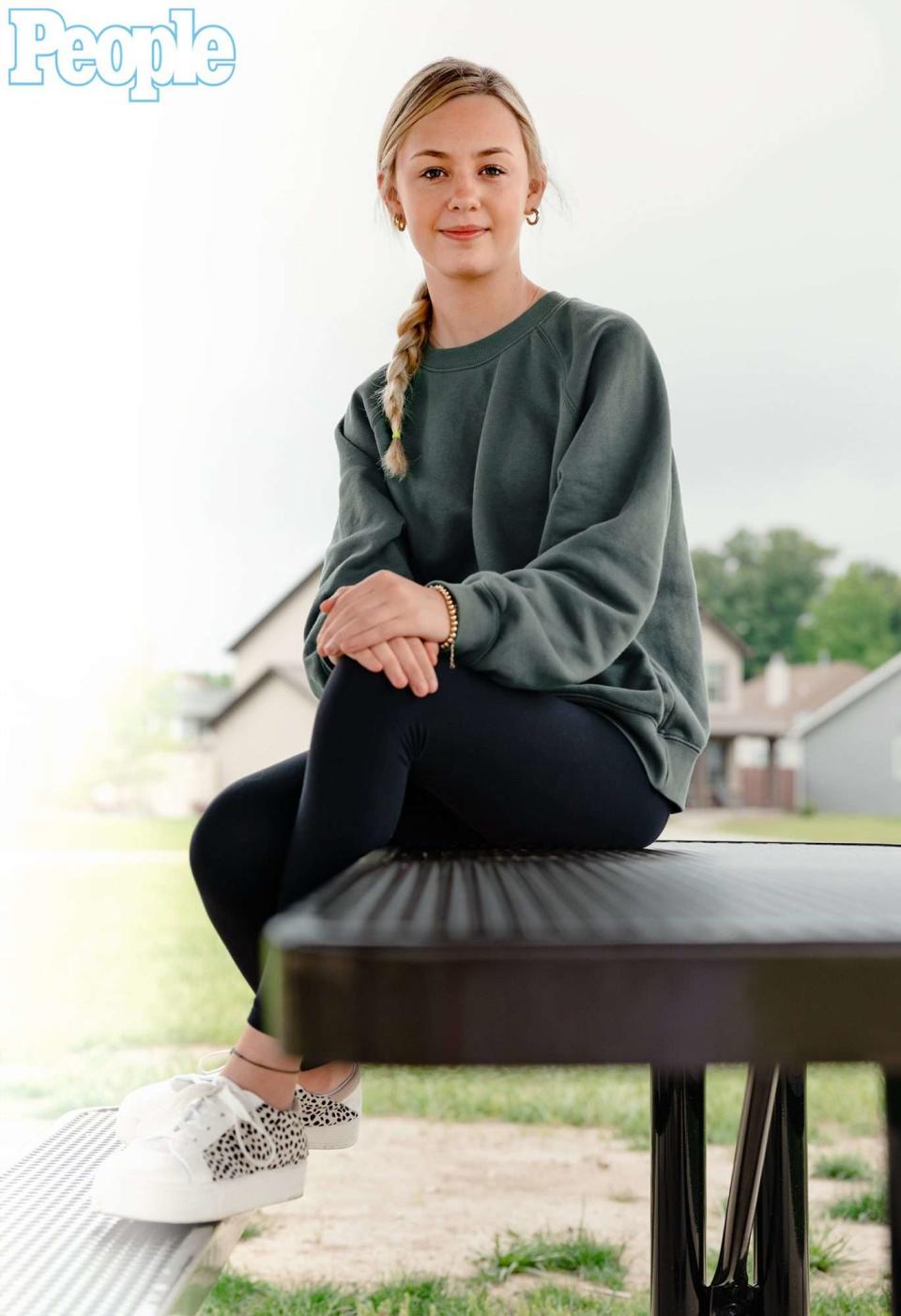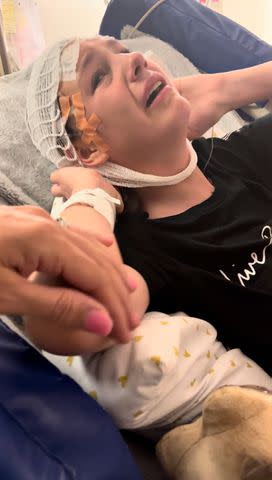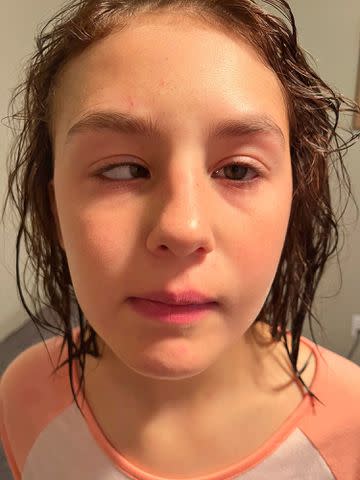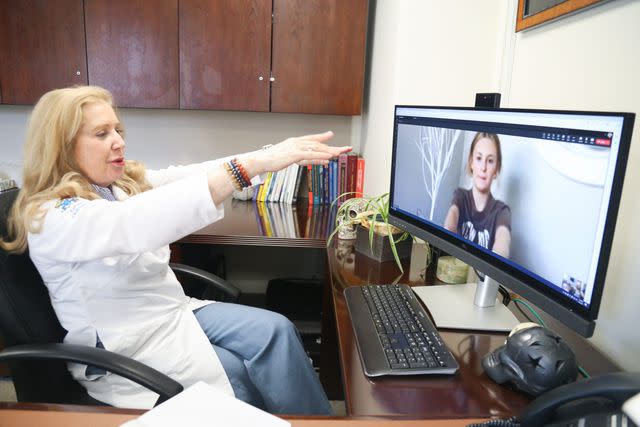Meet the Teen Living with Celine Dion's Disorder, Stiff Person Syndrome (Exclusive)
- Oops!Something went wrong.Please try again later.
After 14-year-old Ayli Dunk's jaw surgery, the teen's immune system attacked her brain and she began experiencing symptoms of Stiff-Person Syndrome: “It Felt Like My Bones Were All Breaking”

In January 2022, Ayli Dunk underwent outpatient surgery on her jaw, but when the teenager woke up from the anesthesia, she didn't recognize her parents and had trouble walking and speaking. Doctors said her symptoms were psychological; her mother didn't believe it. After months of fighting for her daughter, she learned Ayli's diagnosis: autoimmune encephalitis — her immune system was attacking her brain. That led to a new medical mystery: Ayli, now 14, began experiencing episodes of excruciating cramping where her hands and feet would freeze up in claw-like positions — symptoms of Stiff-Person Syndrome, (SPS) the rare neurological disease that Celine Dion suffers from. Ayli and her mother, Lindsey Sutherland, told their story to PEOPLE exclusively in this week's issue.
For months, dread would wash over Ayli Dunk whenever she felt her body begin to stiffen and cramp, knowing there was no way to stop what was coming; she could only cry. "She knew it was about to hurt," says her mother, Lindsey Sutherland. "Her body would contort in ways it should not. The top of her body twists one way and her bottom another. Her feet curl in. And she would bawl because of how painful it is." Dunk would try to describe the episodes to her mother: "It feels like my bones are all breaking," she'd say. Unable to prevent her teen's torment, Sutherland would reassure her: "Babe, it's going to be okay."

But Sutherland wasn't sure those words were true until Dunk finally received a diagnosis last August: Stiff-Person Syndrome (SPS), caused by brain swelling from an autoimmune response to anesthesia, a condition known as autoimmune encephalitis. They later learned that the disorder was triggered by the anesthesia she had received months earlier.
After undergoing jaw surgery in January 2022, Dunk, now 14, went from a healthy teen who loved dancing and making TikToks to "a completely different person," says Sutherland, 37, who is also mom to two younger children with husband Cooper, 40. "When she woke up from the surgery, she did not know us. She could not walk or talk." Hours later "Ayli wouldn't lift her head," her mom recalls. "By the next day, she was terrified of all of us. Her arms were flailing; she would swipe at the air. She hid in the corner."
Related: Céline Dion Diagnosed with Stiff-Person Syndrome — Here's What to Know About the Rare Condition
When her daughter's breathing became erratic and she repeatedly began passing out, Sutherland rushed her to the ER: "I thought she had a stroke." Dunk became unresponsive in the ICU, and doctors told Sutherland to call her husband. "They said if her dad wants to see her, he'd better come now," she recalls.
But after Dunk was revived and a CT scan showed no brain injury, doctors—who initially cited stress as the cause—diagnosed Ayli with toxic encephalopathy, caused by medication. Her medical team sent the family home to Shiloh, Ill., telling them that Ayli should be better when the medication was out of her system.
Instead things got worse. Two weeks later she began experiencing seizures—42 in one day at one point—and started hallucinating. "She was seeing people talking to her and thought bugs were all over her," says Sutherland. Mentally and physically, she was regressing. "She was a straight-A student, and she couldn't hold a pencil. She couldn't count. She didn't know her ABCs. She didn't know how to give herself a bath," says Sutherland. "She had to be watched at all times."
Dunk's memories of that time are hazy, but she remembers trying to keep herself awake at night. "I'd stay up, because I was scared that something was going to happen in my sleep and I wouldn't wake up again," she says.
Ayli's episodes had a profound effect on the whole family. "Ayli would go through moments of just screaming for hours just sitting on the floor, or she would pull her hair or she would see things and hear things," says Sutherland. "It terrified her siblings and they just would cry, they would worry about her."
Over and over, Ayli's tests were normal, and doctors said her symptoms were psychological. "I didn't get it — why did she look so bad, but everything's normal?" Sutherland says. "They stuck that diagnosis on her for psych because of the way she was presenting. It looked psychotic. But that's the way it is for autoimmune encephalitis. Their EEGs are normal. Their MRIs are normal. This is why people get stuck in the system."

Everything changed in May 2022 after Sutherland received a recommendation to watch the 2016 film Brain on Fire, based on the true story of a young woman whose brain inflammation caused similar symptoms. "It was Ayli to a T," Sutherland says.
She realized the only way to determine whether Ayli's brain was affected by encephalitis as well was to have a spinal tap done. She begged Ayli's doctors to do the procedure, which can be uncomfortable and lengthy, and confirm a diagnosis, but they refused. Finally, one of Ayli's doctors told her, "Lindsey, when is enough enough for you? When are you going to stop with this?" Sutherland says she burst into tears: "I'm like, 'She has no quality of life anymore. So no, I'm never going to stop. I have to help her.'"
So she sought out the doctor portrayed in the film, Dr. Souhel Jajjar, and called repeatedly until his office connected her with Dr. Juliann Paolicchi, a pediatric neurologist at Northwell Health in New York City. Dr. Paolicchi recognized Ayli's symptoms over a video call, and after an in-person visit, she diagnosed the teen with autoimmune encephalitis.
A steroid treatment offered "dramatic" results, says Dr. Paolicchi: "She went from writhing in pain and incoherence to sitting up and conversing."

But later that summer Ayli came down with COVID and then began experiencing the cramping symptoms associated with SPS. "The body sort of freezes up, just like when you wake up and you get a charley horse in your calf," says Dr. Paolicchi. "But they don't just have it in their calf, they can have it in their thighs, in their back, in their arms, in their head and neck area. And there is just excruciating pain, and the loss of other function. You can't stand, you can't walk, you can't move when that's going on."
Dr. Paolicchi began Dunk on an IV immunotherapy treatment known as Intravenous immunoglobulin — a therapy that Dunk continues today. Each month, she undergoes five days of IVIG —a treatment she may need the rest of her life, as there's no known cure for her condition. "If she doesn't get the therapy, she'll regress," Sutherland says.
Ayli's long-term prognosis is unknown, Dr. Paolicchi says "There are people who go into a form of remission and they do very well, and then their immune systems can be reactivated and they might need more therapy. That happened to Ayli. She responded well to steroids and then got another infection and really had worsening symptoms."
For now, however, although she still has occasional episodes of cramping in addition to outbursts due to Tourette's (another symptom of her disorder) and panic attacks, she's back to playing basketball and golf and will start high school in the fall. "She's still catching up, but she's ready," Sutherland says. "Our goal is to keep her life as normal as possible. But we can only do what her brain will allow."
For more People news, make sure to sign up for our newsletter!
Read the original article on People.

